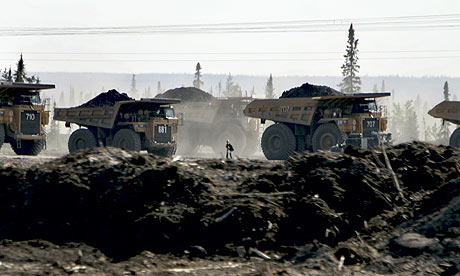1|
Climate activists' targets revealed
Government departments, airports and energy firms are among more than 20 sites which will be targeted by climate change activists later this week, it has been revealed.
Thousands of people from across the UK are expected to attend the annual Climate Camp protest.
The location has remained a tightly-guarded secret, and the venue for a week-long central camp, to be held in London, will be revealed on Wednesday.
But the Press Association has seen a list of 22 targets in London, which includes specific reasons detailing why each site has been selected for action during the protest.
The list includes Government departments such as the Treasury, Business and Enterprise Department, Transport Department and Climate Change Department; energy firms BP and E.ON; the Bank of England; Stock Exchange; Society of British Aerospace Companies; World Coal Institute; Heathrow and London City airports.
Other targets include British Sugar, Rio Tinto, Unilever and airports operator BAA.
Previous climate camps have been held at Heathrow airport, Drax power station in Yorkshire and last year was close to the Kingsnorth power station in Kent.
A spokesman for the Climate Camp told the Press Association: "One of the main aims of the Climate Camp is to take direct action against the route causes of climate change.
"The City of London represents the epicentre of a failed economic system whose obsession with endless growth makes it impossible for us to move forward and deal with climate change.
"The targets have been chosen because of their enormous impact on climate change because of their promotion of failed market logic like carbon trading. Many of these targets can expect a visit over the course of the Climate Camp."
http://news.aol.co.uk/environment-news/climate-activists-targets-revealed/article/20090823090518106059776
2|
Cree aboriginal group to join London climate camp protest over tar sands
Canadian First Nations seek to highlight UK's 'criminal' role in CO2-heavy oil schemes
Terry Macalister
guardian.co.uk, Sunday 23 August 2009 16.14 BST
Article history

A worker walks between huge trucks in Fort McMurray, Alberta. The oil sands extraction process requires top soil to be removed, is highly energy-intensive and releases huge amounts of carbon dioxide. Photograph: Orjan F. Ellingvag/Dagens Naringsliv/Corbis
Members of the Cree aboriginal peoples are to join the Climate Camp protests in the City of London this week in an attempt to draw attention to corporate Britain's "criminal" involvement in the tar sands of Canada.
Five representatives from the Cree First Nations are coming to co-ordinate their campaign against key players in the carbon-heavy energy sector with British environmentalists.
Eriel Tchekwie Deranger, from Fort Chipewyan, a centre of Alberta's tar sands schemes, said: "British companies such as BP and Royal Bank of Scotland in partnership with dozens of other companies are driving this project, which is having such devastating effects on our environment and communities.
"It is destroying the ancient boreal forest, spreading open-pit mining across our territories, contaminating our food and water with toxins, disrupting local wildlife and threatening our way of life," she said.
It showed British companies were complicit in "the biggest environmental crime on the planet" and yet very few people in Britain even knew it was happening, said Deranger. She was speaking ahead of an annual Climate Camp that will be held for one week somewhere in Greater London from this Thursday.
The exact site of the camp has not been revealed as green organisers are worried that the police might move to thwart their plans if they are notified in advance.
BP and Shell are two of the major oil companies extracting oil from the tar sands. The thick and sticky oil can only be removed from the sands by using a lot of water and power as well as producing far heavier CO2 emissions.
RBS, now partly owned by the British government after its financial rescue, is also a target of environmentalists and aboriginals because it is seen as a major funder of such schemes.
The Climate Camp concept started with a protest outside the Drax coal-fired power station in North Yorkshire and was followed up by similar protests at Heathrow – against the proposed third runway – and Kingsnorth in Kent, where E.ON wants to construct a new coal-fired power station.
There was also a Climate Camp in April at Bishopsgate inside the City of London, which became linked with bad policing after a bystander died following a clash with a constable.
The tar sands are seen by many as a particularly dangerous project providing enough carbon to be released in total to tip the world into unstoppable climate change. Shell was the first major European oil company to invest in the Canadian-based operations but BP followed under its chief executive, Tony Hayward.
The oil companies both dispute the amount of pollution caused by tar sands and insist they must be exploited if the world is not going to run out of oil.
But George Poitras, a former chief of the Mikisew Cree First Nation, said the so-called heavy oil schemes were violating treaty rights and putting the lives of locals at risk. He said: "We are seeing a terrifyingly high rate of cancer in Fort Chipewyan, where I live. We are convinced these cancers are linked to the tar sands development on our doorstep."
http://www.guardian.co.uk/business/2009/aug/23/london-tar-sands-climate-protest

